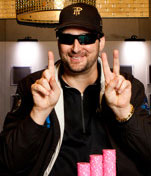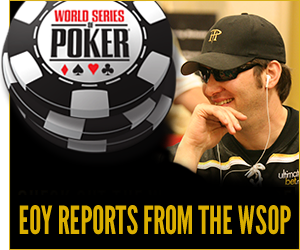-
A Great Call in a Monster Game
I recently played in a $50,000 buy-in no-limit Hold ’em game in Las Vegas. The blinds started out at $200-$400, but a mere two hours into the game they were kicked up to $500-$1,000.
Rebuys were $50,000 a pop, making this particular game one of the biggest no-limit Hold ’em games I have ever played in. A great hand came up during play: With the blinds at $500-$1,000, Player A opened for $4,000, Player B called from the small blind, and Player C called as well with J-10. The flop was Js-10s-4s. Player B checked and Player C checked. Player A bet $15,000, Player B called $15,000 and Player C announced, “I raise.” Player C raised it up $45,000 more, Player A folded and Player B called instantly, but strangely Player B didn’t put any chips into the pot (which is OK as verbal declarations stand).
On the turn the 9h hit, and Player B announced he was all in. Player C studied for a while — with his top two pair — while counting down his own chip stack. Player C had more than $150,000 in chips left in front of him, and he was faced with a tough decision. What would you do with J-10 right here?
Player B is capable of any of the three following moves: slowly playing a huge hand like a flush on the flop, making a huge bluff, or of betting a straight. If Player C called and was beat, then he could pretty much kiss his $150,000 goodbye, unless he hit the 10-to-1 shot (jack or 10) and made a full house. Most of us would fold this hand, unless we had a strong read on our opponent. After all, it’s rare that someone bluffs this much money, and equally rare that another player could make that call.
That’s why I give Player C so much credit for making a great call. It was all down to his read of Player B, and he thought that Player B was bluffing. He had the heart to put the $150,000 into the pot. It would have been easy for Player C to fold and go on with the rest of his evening with $150,000 left in front of him — in fact, he would have still been winning $100,000. So Player C made a great call, but he still wasn’t out of the woods yet as Player B flipped up As-Qh.
Player B had 15 wins: nine spades, three kings, and three eights. Player C had the rest of the deck, or 29 wins: you see, we know of 15 wins for Player B, plus there are eight cards exposed (both hands, plus the four in the middle of the table) making 23 cards, which we subtract from 52 cards total in a deck to come up with 29. So Player C was less than a 2-to-1 favorite (29-to-15) to win the roughly $450,000 pot. When the 3h came off on the river, Player C’s great call had paid off for him. I must say that I give Player B credit for making a tough $150,000 bluff. It takes a lot of heart to shove in $150,000 on a bluff!However, I would have liked his play even more if he would have pushed all-in on the flop. If he did move all-in on the flop — after Player C’s $45,000 raise — he would have been almost even money to win the pot (roughly a 50 percent chance) versus Player C’s hand. And this way he represents to Player C that he has a made flush.
I also had an interesting decision to make that night. While holding 5-5, the flop was 9h-8s-5d, and I bet out big and was called by two players, including Player B. The turn was the 4s, and now Player B bet out $20,000. While raising it up was the obvious move — to clear out any flush draws and/or straight draws — I decided to wait for one more card to come off. I just called because maybe Player B was weak and he would bluff the river. Or maybe Player B was strong, but not strong enough to beat my hand and he would bet the river.
The river was the 4d (9-8-5-4-4), and now Player B made his second biggest bet of the night, he bet out $60,000. The 4d was one of the best cards that I could think of, so I counted down my stack and found that I had another $65,000. As I counted own I was thinking, “Should I move all-in here or not?” It seems like an easy all-in move most of the time, but then again it was Player B’s second-biggest bet of the entire night! I didn’t want to have to rebuy, but the right move is the right move. If I had had another $200,000, then I wouldn’t have moved all-in, but for $65,000 I felt like I had to pull the trigger.
I moved all-in and Player B folded his hand fairly quickly, mumbling that he had a pair of eights.
Making a great call is all about:
A) Reading your opponent perfectly
B) Guts
C) A big heart
D) All of the aboveAnswer: B
Related Posts
- Wisconsin ‘Homeboy’ Poker
- Win the War, Not All the Border Skirmishes
- Rock Stars Can Play, Baby!
- Layne Flack’s Close Call
- Blind’ed at HSP
- Gold Wins (Most Of) Record-Breaking HSP Pot
- I’m a Lucky ‘Bad Boy’
- Protect Your Pocket Eights With A Raise
- A Dirty Win to Start the New Season
- Chan Versus Phil: All-In, All Out, All Over
Recent Posts
- WSOPE 2nd place finish
- Update from this years WSOP 2019
- Happy Holidays! Updated stock at Poker Brat, new book!
- Phil Hellmuth wins historic 15th World Championship!
- Final golden ticket winner coming soon
- Poker Brat – The Phil Hellmuth Jr. Autobiography
- Phil Hellmuth’s “Pokerbrat” – Coming soon to audio book!
- Poker Night in America – Sugar House Casino
- Sugar House w Matt Glantz
- Lost and found

 ™
™








